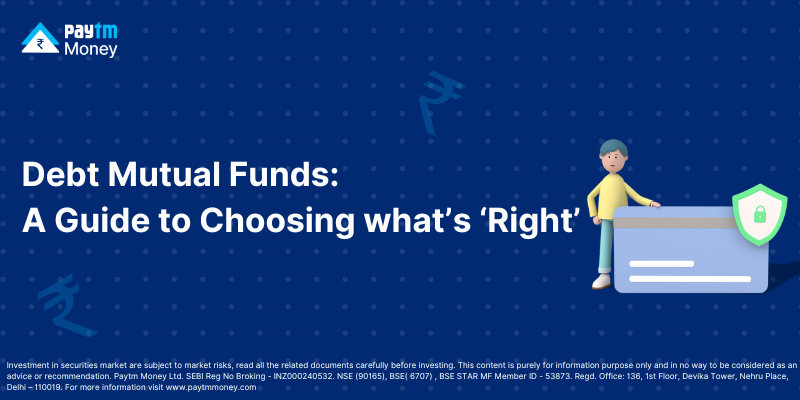How to Choose the Right Debt Mutual Fund for Your Investment Goals7 min read
Have you ever wondered how to make your money work for you while minimizing risk? Debt mutual funds in India offer a fantastic opportunity to achieve this delicate balance. By investing in debt instruments like government securities, corporate bonds, and money market instruments, these funds provide stable returns and preserve capital. But with numerous debt mutual funds available in the market, how do you choose the right one for your goals? In this article, we will unravel the secrets of selecting the perfect debt mutual fund that aligns with your investment objectives and risk profile.
Investment Goals and Risk Profile: The Compass and the Map
Before deciding where to invest, it is essential to understand your personal investment goals, including when you will need the funds and your risk tolerance. By considering these factors, you can determine the most suitable debt fund, considering the investment duration, expected returns, and when you will need liquidity of investment. This understanding becomes particularly valuable when exploring the different types of debt funds available.
It is essential to match the investment horizon with that of the scheme. Funds having a lower average maturity are ideal for short-term holdings as they are well protected from the fluctuating interest rate movements. However, holding them for more than their average maturity may not get you the optimal results.
The higher the average maturity, the greater the uncertainty in the short term. Conversely, the lower the average maturity, the greater the certainty, which in turn lowers volatility.
Types of Debt Funds: Exploring Your Options
While debt funds are generally less risky than equity funds, it is important to note that the subcategories of debt funds have varying risk levels and investment durations. Simply knowing that you want to allocate a certain sum of money to debt funds is not enough. Understanding the nature of different debt funds will help you make an informed decision based on your risk appetite and investment goals.
Debt mutual funds come in various types, each catering to different investment horizons and risk appetites. Just like a bouquet of flowers, each fund has its unique fragrance and charm. For example, if you are seeking steady income over a short period, you may consider liquid funds. These funds are akin to a refreshing spritz of a summer breeze, offering high liquidity and minimal interest rate risk.
On the other hand, if you are ready to embark on a longer journey and desire the potential for higher returns, you might explore income funds.
Let’s explore the different types of schemes in the debt fund category based on the type of instruments they invest in and the tenure of the instruments in the portfolio:
Liquid Funds: These funds have a very low risk and provide high liquidity.
Gilt Funds: Gilt funds carry a moderate level of risk and primarily invest in government securities.
Bond/Income Funds: Bond or income funds involve a higher level of risk and invest in corporate bonds and other fixed-income securities.
Here are the various types of schemes in the debt fund category, which are classified on the basis of the type of instruments they invest in and the tenure of the instruments in the portfolio, as explained below:




Source: AMFI
Link: https://www.amfiindia.com/investor-corner/knowledge-center/debt-fund.html
Consider the Risk Factors Associated with Debt Funds
Debt funds are generally considered less risky than equity funds. However, within the realm of debt funds, there are certain risks to be aware of. Two significant risks associated with investing in a debt mutual fund are interest rate risk and credit risk.
Interest rate risk: This risk is linked to the fluctuation of interest rates. When interest rates increase, the Net Asset Value (NAV) of the fund tends to fall, and vice versa. Short-term funds are less impacted by interest rate fluctuations, whereas long-duration funds are more sensitive to these changes.
Credit risk: Credit risk refers to the possibility of the fund not paying on time. Credit rating agencies, such as CRISIL and ICRA, provide ratings to mutual funds. These ratings are subject to change over time. If the fund holds papers that have been downgraded by the market, it may receive a lower credit rating and consequently experience a decrease in NAV.
Considering these risks is crucial when evaluating and selecting a debt fund that aligns with your risk tolerance and investment objectives.

Source: ValueResearch
Link:https://www.valueresearchonline.com/stories/50382/what-the-prc-matrix-tells-about-fund-houses/
Expenses and Fees: The Price of Admission
Every adventure comes with a price tag and investing in debt mutual funds is no exception. Just like buying tickets to an amusement park, you need to consider the expenses and fees associated with the fund. Debt mutual funds generally have lower expense ratios compared to equity mutual funds. This is because managing debt portfolios involves less active management and trading compared to equity portfolios. Therefore, the costs associated with running debt mutual funds are relatively lower
Under SEBI (Mutual Funds) Regulations, 1996, Mutual Funds are permitted to charge certain operating expenses for managing a mutual fund scheme also known as ‘Total Expense Ratio’ (TER). There are regulatory limits specified, think of it as a cap on the maximum expense that can be charged to the mutual fund by the AMC.

Source: AMFI
Link: https://www.amfiindia.com/investor-corner/knowledge-center/Expense-Ratio.html
However, SEBI has proposed a new set of TER guidelines for 2023-24. Under the new proposal, the TER for AUM up to ₹2,500 crore has been fixed at 2.55 per cent, while it falls to 2.45 per cent and 2.30 per cent for the next ₹2,500 crore and ₹5,000 crore of AUM. On the next ₹40,000 crore to ₹50,000 crore of the daily net assets, the TER reduces 0.05 per cent for every increase of ₹5,000 crore of daily net assets or part thereof of the AUM of equity and equity-related instruments.
On the next ₹50,000 crore to ₹1-lakh crore of the daily net assets, the TER is cut by 0.10 per cent for every increase of ₹10,000 crore of daily net assets or part thereof of the AUM of equity and equity-related instruments. On the balance of the assets, a TER of 1.30 per cent will be charged. Though the highest TER slab will increase to 2.55 per cent from the current 2.25 per cent, it will include all costs and expenses, including GST on management fees, brokerage and transaction costs and B-30 incentive.
Tax Implications
The Finance Bill 2023 amended the debt mutual fund taxation rule by removing the indexation benefit in case of long-term capital gains on these funds. Previously, if you sold your debt fund after holding it for three years, it was taxed at 20 per cent after indexation benefit was provided. The benefit of indexation is no longer applicable for investments in these funds made on or after April 1, 2023.
This rule applies to all mutual fund schemes, including Gold Funds and International Funds, that invest less than 35% of their assets in domestic equities. As a result, if you fall under the highest tax bracket, debt mutual funds are no longer tax-efficient than Bank FDs
It’s crucial to note that these new regulations will only apply to fresh investments made on or after April 1, 2023. Existing investments will not be affected by the changes.
Summing Up
While mutual funds are subject to market risks, debt funds are relatively safer investment options compared to other types of mutual funds. They offer predictable returns, increased liquidity, and convenience, making them highly sought-after by investors with a low-risk appetite.
So, dear reader, as you embark on your journey to choose the right debt mutual fund for your goals, ask yourself these questions: What investment horizon and risk profile do I possess? What are my financial goals, and how can debt mutual funds help me achieve them? Just like a captain steering a ship through turbulent waters, you hold the power to navigate your investment journey wisely. Happy investing!
Disclaimer: Investment in Mutual Fund investments and securities market are subject to market risks, read all the related documents carefully before investing, only for internal consumption for the registered client of PML for addressing tax related guidance. Not for circulation. All the discussions are purely educational in nature and are in no way an advice or recommendation, representations are not indicative of future results. Paytm Money Ltd. SEBI Reg No. Broking- INZ000240532. NSE(90165), BSE(6707) Reg Office: 136, 1st Floor, Devika Tower, Nehru Place, Delhi – 110019.




